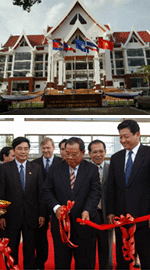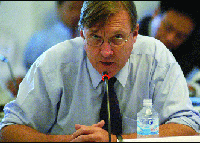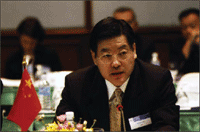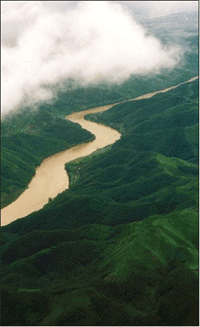Corporate highlights
Opening of a new headquarters

H.E. Mr Bounnhang Vorachith,
Prime Minister of the Lao PDR,
declares the new building open.
In June 2004 the Mekong River Commission Secretariat completed its transfer to its new headquarters in Vientiane, Lao PDR, which was provided by the Government of Lao PDR
The move took place over a month, with staff beginning to pack up their Phnom Penh offices from mid-May and the move into the building starting from June 21. On July 1 the doors opened to the public.
The building was officially inaugurated on 27 August by H.E. Mr Bounnhang Vorachith, Prime Minister of the Lao PDR, in the presence of government representatives from Cambodia, Lao PDR, Thailand and Viet Nam, as well as Vientianebased dignitaries and representatives from the international diplomatic, donor and NGO communities.
In order to minimise the impact of the relocation on the MRC's ongong programme implementation support staff undertook on-the-job training in Phnom Penh (alongside their Cambodian counterparts), prior to the move. In addition a number of Cambodian support staff moved to Lao PDR for a period of up to one year to help train the second batch of new support staff in order to minimise the impact of a staff changeover.
The MRCS has continued to hire more local, regional and international professional and support staff, and aims to bring the full employee level up to around 120.
Welcome to a new Chief Executive Officer

Dr Cogels addresses donors at the
informal donor meeting held in
Vientiane in August 2004.
On 9 August 2004, Dr Olivier Cogels took up his role as Chief Executive Officer of the Mekong River Commission.
Dr Cogels is a Belgian citizen. He holds an MSc in Land and Water Engineering and a PhD in Hydrodynamics and Water Resources from the Catholic University of Louvain. He also did a postdoctorate at the University of California, Davis. After an academic career at the University of Louvain, he gained extensive experience in development programmes and institutions, working with such bodies as the European Commission, the World Bank, the United Nations and with bilateral agencies.
Before accepting this new position he had worked with the Food and Agriculture Organisation of the United Nations (FAO) in Rome since 2002, where he managed the International Programme for Technology and Research in Irrigation and Drainage (IPTRID).
Dr Cogels says his vision for the MRC is for it to become the key actor in alleviating poverty and increasing economic wellbeing in the Mekong Basin, in order to meet the Millennium Goals of the United Nations. He emphasises the need for a holistic vision of Integrated Water Resources Management and Development at basin scale, harnessing (in a sustainable way) the river’s huge economic potential for navigation, energy production, agriculture, fisheries and tourism.
The new CEO sees the role of the MRC as an investment facilitator, encouraging regional cooperation through the delivery of accurate and reliable decision-support information to planners and policy-makers so they can help member countries implement balanced and sustainable development strategies at basin scale. However, this development must be with due regard for the environment.
The MRC provides a platform for dialogue and negotiation. It offers an ideal institutional basis for joint planning and coordinated implementation of an Integrated Water Resources Development and Management Programme, closely linked with (and as a complement to) other development programmes in the region.
One of Dr Cogels’ principal objectives is to continue to stimulate concrete cooperation with MRC’s dialogue partners China and Myanmar, based on a constructive and pragmatic approach through joint activities within the framework of the MRC’s Mekong Basin Development Plan Programme. “Increasing our cooperation, step-bystep, on the basis of trust and the search for mutual benefits is the most important thing,” he says.
Dialogue Partners open to discussion

China’s representative Mr Zhang
Wanhai at the 9th Dialogue Meeting.
The low river conditions experienced in the 2004 dry season prompted much comment in the media regarding the impact of developments in upstream countries.
In response to this, MRC scientists compiled a Technical Study on Rainfall and Discharge in the Lower Mekong Basin.
After analysis of river flows and height data, combined with rainfall data from the basin, the report concluded the drought was caused by unusually low rainfall throughout the basin both in the wet season and the dry season, and not by any dam construction taking place in upstream countries.
Speaking at the 9th Dialogue meeting between MRC members and dialogue partners China and Myanmar, held on 28 August in Vientiane, Lao PDR, China highlighted the need to promote the sustainable use of water resources as well as the development of regional economies. The dialogue meeting showed that both the MRC and its dialogue partners attached great importance to this issue.
The subject of the two existing dams and the building of two other dams on the Lancang (Mekong) was openly discussed in a constructive way, with the intention to work on appropriate mitigation measures in order to minimise the potential impacts, namely river fluctuations.
MRC joins fight to preserve Mekong wetlands

In July 2004 the MRC joined with UNDP and IUCN (the World Conservation Union) to launch the Mekong Wetlands Biodiversity and Sustainable Use Programme (MWBP).
The MWBP is a five-year (2004-2009), $30 million initiative working in the four Lower Mekong countries - Cambodia, Lao PDR, Thailand, and Vietnam. While it is jointly managed, the programme will run in parallel and be closely coordinated with MRC structures and decision-making processes.
The programme will work at three levels. At the regional level, the basinwide policy framework and economic environment will be developed to be more supportive of wetland biodiversity conservation and sustainable use through working with ministers and developing wetland policy guidelines. The institutional capacity to implement these policies will be strengthened. This regional approach will be made possible through the project's strong partnership with the MRC.
Encouraging a multi-sector approach, through building capacity, and increasing public involvement will enhance planning processes at the national level, The programme will work with the national institutions responsible for wetland and Ramsar issues in each country, as well as the four National Mekong Committees.
At the local level, integrated planning and equitable community-based natural resource management will be implemented at four demonstration sites: Stoeng Treng Ramsar Site, Cambodia; Attapeu Province, Lao PDR; the Lower Songkhram Basin, Thailand; and the Plain of Reeds, in Viet Nam. Each site represents one of the four key wetland ecosystems representative of the Lower Mekong Basin as a whole.
In the demonstration sites, the programme will help to identify the values of the freshwater ecosystem, and work with local people to develop improved management systems and alternative livelihood options. Training will be provided and information will be disseminated as part of targeted awareness campaigns. Technical assistance will also be provided to support the implementation of the Ramsar Convention on Wetlands at the national and site level.
Challenge Programme moves ahead

The MRC is the coordinator for the The CGIAR Challenge Programme for Water and Food (CPWF) in the Mekong Basin.
The CPWF, which was launched in 2003, aims to increase food production in agriculture, while at the same time increasing water productivity, so more food can be grown with less water. Much of the emphasis in the CPWF is on the partnerships it has created between research institutions in the Mekong countries, and advanced research institutions, such as those within the CGIAR.
The CPWF has selected eight projects in the Mekong River Basin from the 50 submissions shortlisted for funding under the CPWF last year.
The projects cover a range of fields of research including minimising the impact of salt-affected areas, development of new strains of rice, improving aquaculture and governance.They seek to meet some of the bigger water resource issues facing the Mekong Basin in the coming years.
An additional contribution to the MRC's involvement in the Challenge Programme is the production of a new publication called Mekong Research,which will summarise research findings and outputs from the region.
New Document Management System
Last year saw the start of construction of the MRC Document Management System (DMS) already under development by Hatfield Consultants under the MRC-IS Portal project, in close coordination with the Technical Support Division. This should be operational by June 2005. Documents on the DMS will include MRC project/programme reports, outputs, occasional papers, technical and research papers and other publications.
Choose a newsletter: